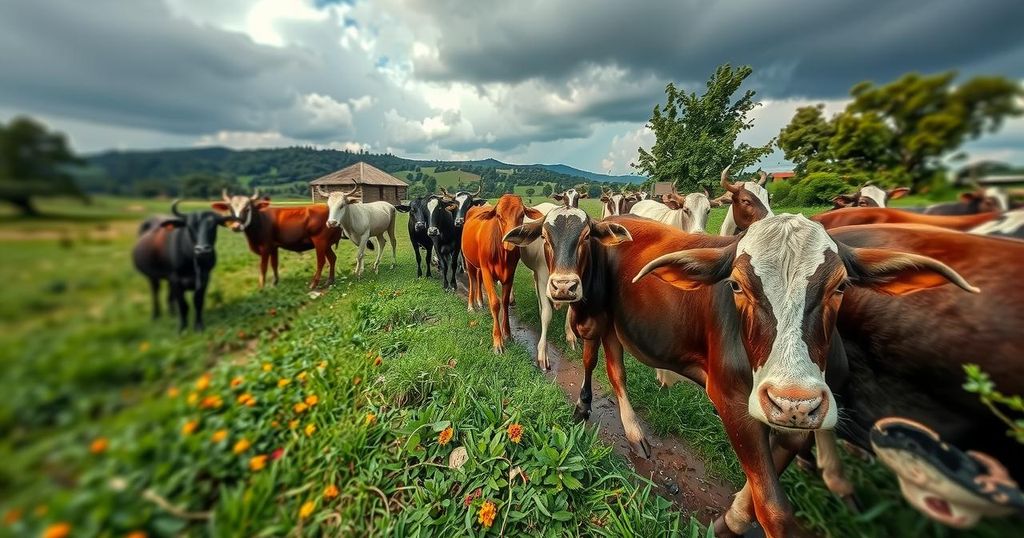Climate Change and Livestock Diseases: Tensions at the Kenya-Uganda Border
The article examines the tensions along the Kenya-Uganda border that arise from climate change-related livestock diseases, highlighting how prolonged drought has pushed pastoralists to seek resources in Uganda, leading to conflicts. Joint health initiatives are necessary to address these issues, with local leaders calling for collaborative approaches to ensure the well-being of livestock and communities.
The Kenya-Uganda border is currently facing escalating tensions primarily fueled by climate change-induced livestock diseases. The region has experienced relative peace since the 1973 Lokiriama Peace Accord, which saw rival pastoral communities agree to cease hostilities and promote cross-border trade. However, recent prolonged droughts have intensified resource scarcity in Turkana, pushing pastoralists to seek relief in Uganda’s Karamoja region. This search for pasture and water has unfortunately led to conflicts, with armed bandits increasingly targeting vulnerable herders. Herders like Mr. Korobe Ngasike have reported that coordinated security measures, while beneficial in addressing banditry, are now challenged by the threat of transboundary diseases exacerbated by changing climatic conditions. Outbreaks of diseases such as Peste des Petits Ruminants and trypanosomiasis have devastated livestock, prompting herders to risk settling in areas with high disease burdens. The community’s struggle to restore their livestock has shifted from raiding to prioritizing health, owing to the fear of disease. Joint initiatives focused on animal and human health have been identified as vital solutions by local leaders and peace-building organizations. Mr. Joseph Areng, a Peace Building Officer, highlighted the necessity for mass livestock treatment and vaccination efforts, asserting that they would not only ensure sustainable pastoral systems but also enhance coexistence between communities. There is also a push for creating equitable resource-sharing policies amidst the pressures of climate change and rapid urbanization. Pastoralists like Mr. Charles Ekai have expressed frustration over livestock losses attributed to diseases transmitted by tsetse flies. The dire state of veterinary services, hindered by poor infrastructure, has exacerbated their plight. In discussions surrounding regional solidarity, Turkana Governor Jeremiah Lomorukai and Ugandan Minister for Karamoja Affairs, Mr. Peter Lokeris, emphasized the importance of collaboration in managing emerging challenges at the border. The governor advocated for the prompt completion of resource sharing agreements between Kenya and Uganda, acknowledging their potential to foster socio-economic development. Both leaders asserted that continued peace is essential for the region’s progress and that it is vital to maintain strong intercommunity bonds to facilitate long-term stability.
The article discusses the impact of climate change on livestock health along the Kenya-Uganda border, specifically focusing on how it has increased the incidence of transboundary animal diseases. It outlines the historical context of the region’s peace since the 1973 accords and how current environmental challenges disrupt that stability. The interplay of scarcity of resources and the emergence of banditry due to drought has led to increased conflict among pastoralist communities. Additionally, the text highlights efforts by local leaders and organizations to address these issues through joint health interventions while underscoring the need for policy development to tackle the negative effects of climate change and promote sustainable practices.
In conclusion, the ongoing tensions at the Kenya-Uganda border due to climate change-induced livestock diseases underscore the urgent need for collaborative interventions among local communities and governments. The historical context of peace efforts in the region, coupled with current environmental pressures, necessitates effective strategies for disease management and resource sharing. It is crucial for leaders to foster cooperation to ensure sustainable pastoralism and mitigate the impacts of climate change on livestock health and livelihoods.
Original Source: nation.africa




Post Comment